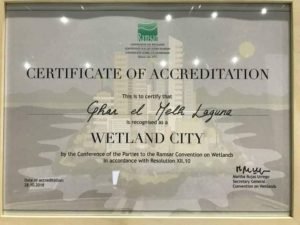Ghar El Melh is now first Arab, North African city in Ramsar List of Wetlands of International Importance
Tunisian seaside city Ghar El Melh located in the governorate of Bizerte (North of Tunisia) was granted the Ramsar Wetland Conservation Award to become the first Arab and North African city in the Ramsar List of Wetlands of International Importance.
Eighteen cities from seven countries – China, France, Hungary, Madagascar, South Korea, Sri Lanka and Tunisia – received the prestigious accreditation during a boisterous ceremony at the 13thConference of the Parties to the Ramsar Convention on Wetlands (COP13) in Dubai.
This award was handed, on Wednesday in Dubai, by former and present mayors of Ghar El Melh.
This award is the outcome of the fruitful collaboration of the ministry’s General-Directorate of Forests and the World Wildlife Fund for Nature (WWF) Regional Office for Africa with the support of Secretariat of the Ramsar Convention and the Mediterranean Wetlands (MedWet) Initiative that ensured the compliance with this accreditation.
Ghar El Melh has a lake and wetlands of international importance.
The Ramsar Convention recommends the guarantee of the quality of water, adopt a land use and disaster management plan and integrate urban planning in wetland management.
Additionally, The convention further calls on the civil society to participate in the preservation of traditional fishing and farming practices
The natural wealth of the region has already is a key factor for the listing in the Ramsar wetland of international importance list since 2007, as reflected by the Dar El Bhira wetland museum.
WWF worked with the city authorities and communities in the Tunisian city of Ghar el Melh, which inspired this transformational initiative, and in three Chinese cities – Changde, Changshu and Haerbin, which boast a combined population of 23 million. 
“These pioneer cities have taken exceptional steps to safeguard their urban wetlands and will serve as examples and inspire other cities towards sustainable urbanization,” said Martha Rojas Urrego, Secretary General of the Ramsar Convention, during the ceremony.
The Convention on Wetlands, called the Ramsar Convention, is the intergovernmental treaty that provides the framework for the conservation and wise use of wetlands and their resources.
The Convention was adopted in the Iranian city of Ramsar in 1971 and came into force in 1975. Since then, almost 90% of UN member states, from all the world’s geographic regions, have acceded to become “Contracting Parties”.
TunisianMonitorOnline




